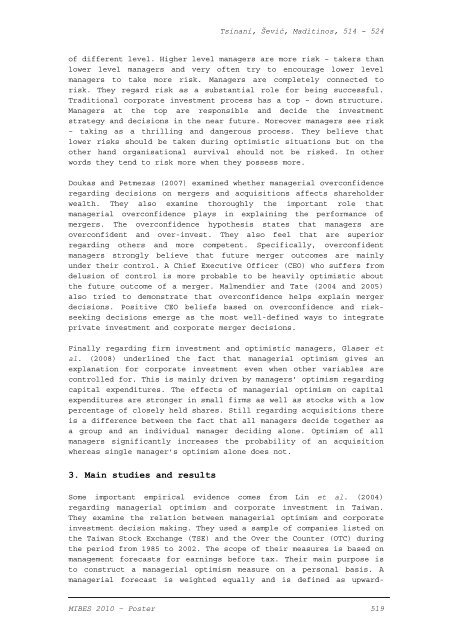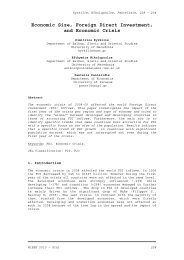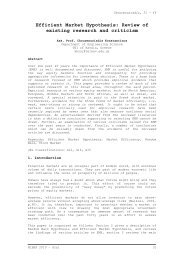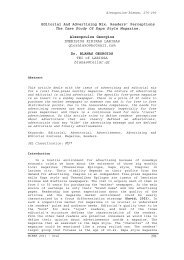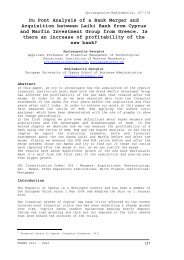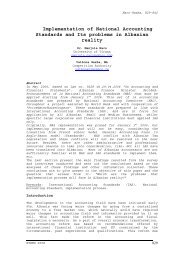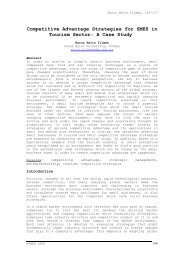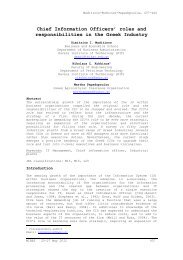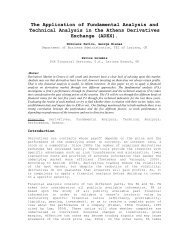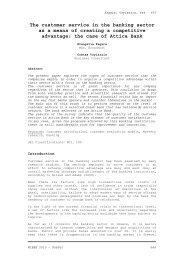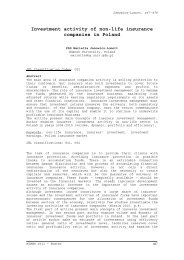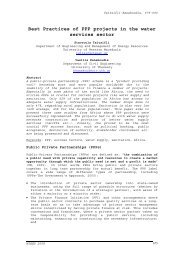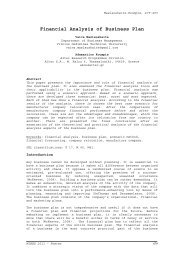Decisionâmaking process under risk and uncertainty â the ... - mibes
Decisionâmaking process under risk and uncertainty â the ... - mibes
Decisionâmaking process under risk and uncertainty â the ... - mibes
You also want an ePaper? Increase the reach of your titles
YUMPU automatically turns print PDFs into web optimized ePapers that Google loves.
Tsinani, Šević, Maditinos, 514 - 524<br />
of different level. Higher level managers are more <strong>risk</strong> – takers than<br />
lower level managers <strong>and</strong> very often try to encourage lower level<br />
managers to take more <strong>risk</strong>. Managers are completely connected to<br />
<strong>risk</strong>. They regard <strong>risk</strong> as a substantial role for being successful.<br />
Traditional corporate investment <strong>process</strong> has a top – down structure.<br />
Managers at <strong>the</strong> top are responsible <strong>and</strong> decide <strong>the</strong> investment<br />
strategy <strong>and</strong> decisions in <strong>the</strong> near future. Moreover managers see <strong>risk</strong><br />
– taking as a thrilling <strong>and</strong> dangerous <strong>process</strong>. They believe that<br />
lower <strong>risk</strong>s should be taken during optimistic situations but on <strong>the</strong><br />
o<strong>the</strong>r h<strong>and</strong> organisational survival should not be <strong>risk</strong>ed. In o<strong>the</strong>r<br />
words <strong>the</strong>y tend to <strong>risk</strong> more when <strong>the</strong>y possess more.<br />
Doukas <strong>and</strong> Petmezas (2007) examined whe<strong>the</strong>r managerial overconfidence<br />
regarding decisions on mergers <strong>and</strong> acquisitions affects shareholder<br />
wealth. They also examine thoroughly <strong>the</strong> important role that<br />
managerial overconfidence plays in explaining <strong>the</strong> performance of<br />
mergers. The overconfidence hypo<strong>the</strong>sis states that managers are<br />
overconfident <strong>and</strong> over-invest. They also feel that are superior<br />
regarding o<strong>the</strong>rs <strong>and</strong> more competent. Specifically, overconfident<br />
managers strongly believe that future merger outcomes are mainly<br />
<strong>under</strong> <strong>the</strong>ir control. A Chief Executive Officer (CEO) who suffers from<br />
delusion of control is more probable to be heavily optimistic about<br />
<strong>the</strong> future outcome of a merger. Malmendier <strong>and</strong> Tate (2004 <strong>and</strong> 2005)<br />
also tried to demonstrate that overconfidence helps explain merger<br />
decisions. Positive CEO beliefs based on overconfidence <strong>and</strong> <strong>risk</strong>seeking<br />
decisions emerge as <strong>the</strong> most well-defined ways to integrate<br />
private investment <strong>and</strong> corporate merger decisions.<br />
Finally regarding firm investment <strong>and</strong> optimistic managers, Glaser et<br />
al. (2008) <strong>under</strong>lined <strong>the</strong> fact that managerial optimism gives an<br />
explanation for corporate investment even when o<strong>the</strong>r variables are<br />
controlled for. This is mainly driven by managers’ optimism regarding<br />
capital expenditures. The effects of managerial optimism on capital<br />
expenditures are stronger in small firms as well as stocks with a low<br />
percentage of closely held shares. Still regarding acquisitions <strong>the</strong>re<br />
is a difference between <strong>the</strong> fact that all managers decide toge<strong>the</strong>r as<br />
a group <strong>and</strong> an individual manager deciding alone. Optimism of all<br />
managers significantly increases <strong>the</strong> probability of an acquisition<br />
whereas single manager’s optimism alone does not.<br />
3. Main studies <strong>and</strong> results<br />
Some important empirical evidence comes from Lin et al. (2004)<br />
regarding managerial optimism <strong>and</strong> corporate investment in Taiwan.<br />
They examine <strong>the</strong> relation between managerial optimism <strong>and</strong> corporate<br />
investment decision making. They used a sample of companies listed on<br />
<strong>the</strong> Taiwan Stock Exchange (TSE) <strong>and</strong> <strong>the</strong> Over <strong>the</strong> Counter (OTC) during<br />
<strong>the</strong> period from 1985 to 2002. The scope of <strong>the</strong>ir measures is based on<br />
management forecasts for earnings before tax. Their main purpose is<br />
to construct a managerial optimism measure on a personal basis. A<br />
managerial forecast is weighted equally <strong>and</strong> is defined as upward-<br />
MIBES 2010 – Poster 519


